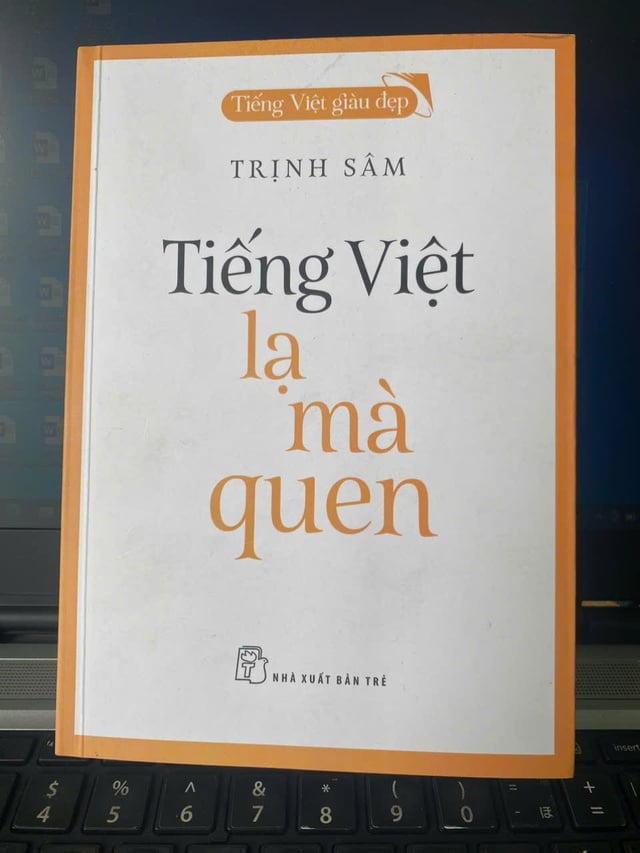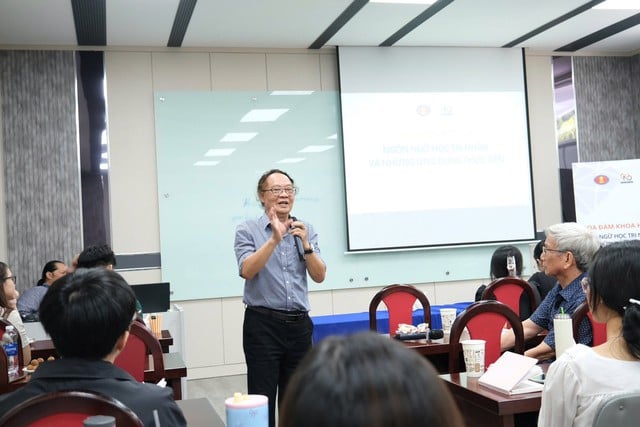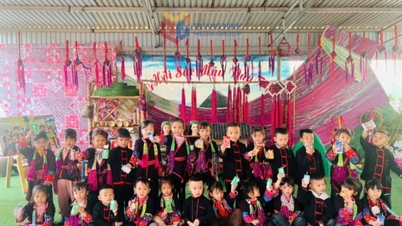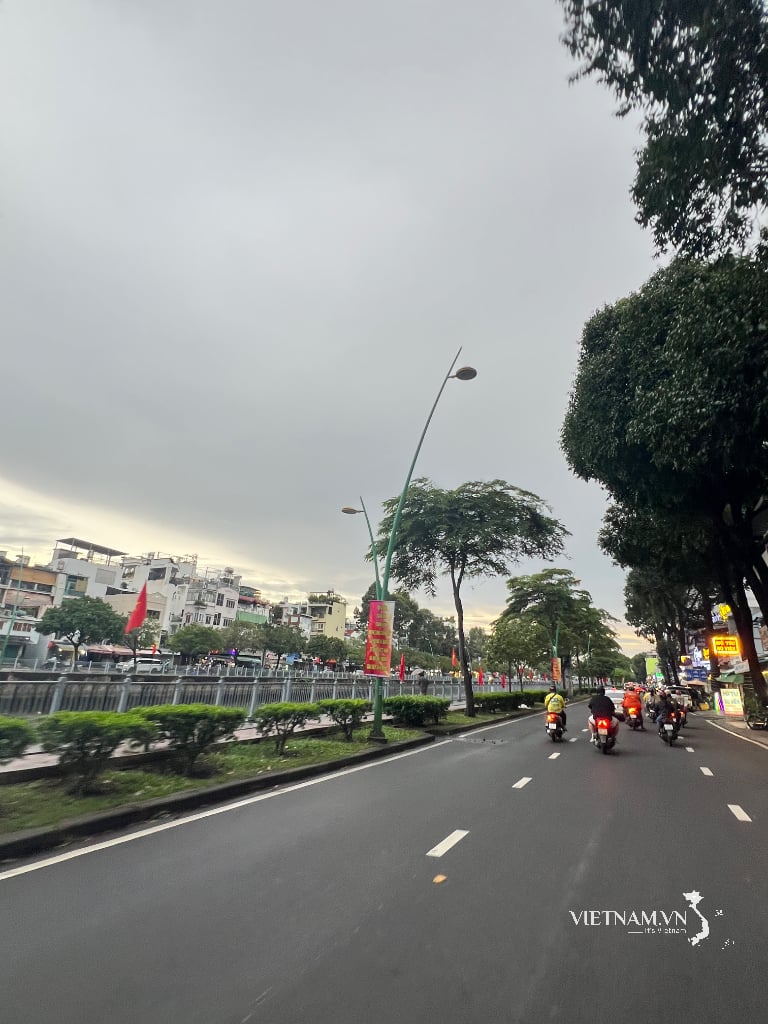Drawing from the practical experience and development of modern Vietnamese, "Vietnamese: Familiar Yet Strange " (comprising 23 concise articles) successively leads readers to fascinating and profound discoveries about the Vietnamese language through the cognitive linguistic approach.
The Vietnamese people's habit of using language is like a survival instinct.
According to author Trinh Sam, cognitive linguistics is a science that studies language as an activity of the mind, focusing on how humans use thinking and perception to create and receive language . Cognitive linguistics views language not only as a system of rules but also as closely linked to a person's worldview . Using language is also when people utilize their cultural level and their level of understanding of various aspects of social life.
That's why the Vietnamese have many proverbs about the use of language, such as: "Words cost nothing to buy/Choose your words carefully to please others," "Words can cost blood..." The Chinese also have the saying, " Once a word is spoken, even four horses cannot catch it ," meaning that once words are spoken, they cannot be taken back. These proverbs emphasize the importance of being cautious when speaking and using language... This is a manifestation of cognitive linguistics.

From an academic perspective, "Vietnamese: Strange Yet Familiar" is a highly commendable study that the author has published widely for readers.
PHOTO: HA TUNG SON
In the light of epistemological principles within the field of linguistics, "Vietnamese: Strange Yet Familiar " is a book that addresses the language usage habits of the Vietnamese people, closely linked to the historical development and civilization of the country.
In the articles "The Conceptual Realm of Rivers and Water in Vietnamese Perception" and " The Conceptual Realm of Rivers and Water in Southern Vietnamese Perception ," the author presents compelling hypotheses. From ancient times, the Vietnamese people have been closely connected to rivers and water; therefore, their language is inseparable from water as a crucial element of survival. Consequently, the Vietnamese also possess the characteristics of softness, flexibility, adaptability, and fluidity like water. From this practical perspective, Trinh Sam concludes that adaptability and balance are the secrets to the Vietnamese people's survival throughout the ages. This explains why rivers and water play such a widespread role in the linguistic life of our people. From this, the author of "Strange Yet Familiar Vietnamese" makes a very interesting observation: people use the word "lặn lội" (toiling) even when walking on land – "lặn lội đến thăm nhau" (toiling to visit each other), " lặn rời tác văn sở" ( to disappear from the office), " lặn mất biến" (to vanish from the classroom); people use the word "bến" (to hitchhike ) even when walking on land (to cross the river), and "bến xe" (bus station) even when on land…
The Vietnamese language, both familiar and unfamiliar , demonstrates that language always reflects aspects of human perception, knowledge, culture, and level of civilization in a constantly developing society.
Theory is derived from practice.
That is the very compelling research direction of Associate Professor Trinh Sam in "Vietnamese: Strange Yet Familiar." While writing about linguistic theory, he doesn't rigidly impose scientific conclusions on the actual use of the Vietnamese language. Therefore, "Vietnamese: Strange Yet Familiar" offers practical lessons in cognitive linguistics, helping readers better understand the linguistic life of the society we live in.
In the article "The Linguistic Style of President Ho Chi Minh from the Perspective of Cognitive Linguistics ," the author begins with President Ho Chi Minh's language habits, clearly defining criteria such as what to write, who to write for, and how to write. This is something President Ho Chi Minh almost perfectly addressed, thus creating his linguistic style. In this comprehensive article, the author discusses the prominent issues of Ho Chi Minh's linguistic style from the perspective of cognitive linguistics. These issues include: conceptual metaphor and the study of Ho Chi Minh's language; empiricism and the study of Ho Chi Minh's language; and prominence and the study of Ho Chi Minh's language. Based on specific textual evidence in President Ho Chi Minh's linguistic legacy, author Trinh Sam observes that, with the three premises outlined above, it can be noted and seen that this is an explanatory approach that will certainly enrich and comprehensively enrich the research picture on President Ho Chi Minh's thought in general, and his linguistic style in particular.
This also means that cognitive linguistics is an effective key to unlocking new doors in the study of linguistic style, from a specific author to the language of an entire nation. This is also the most significant contribution of Associate Professor Trinh Sam in his book "Vietnamese: Strange Yet Familiar."

Associate Professor Dr. Trinh Sam, author of the book "Vietnamese Language: Strange Yet Familiar"
PHOTO: PROVIDED BY THE SUBJECT
The close connection between language and culture
In "Vietnamese: Strange Yet Familiar," the author begins with the habitual use of rhetorical devices in the Vietnamese language, such as metaphor and metonymy, to gain a deeper understanding of the meaning of the Vietnamese language, encompassing everything from spoken words to literary works and poetry. This is clearly demonstrated by a specific example: the poetry of Nguyen Kim Huy, a prominent writer from Da Nang, who subtly employs metaphor: "Poetic metaphor, a type of metaphor appearing in literature, bears the personal imprint of the author: ' You are the sunset, Dai Lai is also the sunset / As evening falls, both of us feel numb… Dai Lai is the sunset, and you are also in the twilight / The two of us walk side by side while the day goes straight ahead' ( Dai Lai Sunset , Nguyen Kim Huy)." This is the light of poetry and also the light of culture emanating from the beauty of the language style.
Based on the theory of cognitive linguistics, "Vietnamese: Strange Yet Familiar" demonstrates that language is a mirror reflecting how humans perceive the natural and social world. Socio-cultural contexts encompass the linguistic sphere that people use daily through spoken and written language. The higher the culture, the more refined and beautiful the language. "Vietnamese: Strange Yet Familiar" successfully embodies this truth.
Reading Vietnamese, which is both familiar and unfamiliar, readers will also be exposed to other interesting topics within the framework of cognitive linguistics. For example: conceptual metaphor, cultural interaction, linguistic thinking, the fascinating Vietnamese language…
Associate Professor Dr. Trinh Sam, former lecturer in linguistics at the Faculty of Literature - Quy Nhon University of Education (now Quy Nhon University), and lecturer in linguistics at the Faculty of Literature - Ho Chi Minh City University of Education, has dedicated his life to researching and teaching linguistics at the undergraduate and postgraduate levels. Based on his practical research and teaching experience in linguistics, Trinh Sam wrote "Vietnamese: Strange Yet Familiar" as a publication and to disseminate the latest knowledge he has acquired. Trinh Sam's writing style is concise and clear, presenting issues and concepts specifically, inspiring readers to love Vietnamese as their mother tongue from an academic perspective of cognitive linguistics. Therefore, "Vietnamese: Strange Yet Familiar" contributes to further understanding and appreciation of the Vietnamese language, highlighting its richness and beauty. And so, "Vietnamese: Familiar Yet Strange" is one of the important publications that the Youth Publishing House has included in its series of books on the rich and beautiful Vietnamese language, with many useful and interesting things.
Source: https://thanhnien.vn/tieng-viet-la-ma-quen-185251121101658901.htm



![[Photo] Prime Minister Pham Minh Chinh presides over a meeting to assess the situation during the Lunar New Year holiday.](https://vphoto.vietnam.vn/thumb/1200x675/vietnam/resource/IMAGE/2026/02/22/1771768925196_ndo_br_dsc-6283-jpg.webp)



















![[Video] Vibrant colors of brocade at Y Tý market](https://vphoto.vietnam.vn/thumb/402x226/vietnam/resource/IMAGE/2026/02/22/1771769235274_720-jpg.webp)






























































































Comment (0)